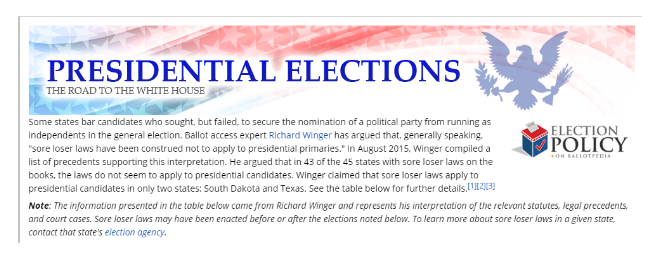For most Sanders supporters, the last year has been difficult to cope with. The divide between those voting for Green Party candidate, Jill Stein, and those planning to write in Bernie Sanders is becoming a growing concern. Some will vote for Bernie if the DNC replaces Hillary Clinton (unlikely), while others are dedicated to voting Green, regardless. One scandal after another has further revealed the devious nature of the “democratic” candidate, Hillary Clinton, as well the media’s bias unwillingness to cover topics exposing such. More than ever, I’ve resorted to personal research and peer input to sift through information, and while this is good practice, it’s also time consuming and frustrating at times. This election cycle has further destroyed my trust in the United States government as well as the companies I rely on daily.
Some states have “sore loser” laws, dictating that candidates who lost in the primary election cannot then run as an independant in the general election. When I searched these legalities using google, I was provided with the following information:

“Sixteen states confirmed to Conservative Review that they have sore-loser laws which apply to presidential candidates: Alabama, Arizona, Georgia, Idaho, Illinois, Mississippi, Montana, North Carolina, Ohio, Oregon, Pennsylvania, South Carolina,South Dakota, Tennessee, Texas, and West Virginia.”
Google even offers this information to anyone who searches for something remotely similar:

This information is disheartening, to say the least. For some, this result may be the end of research road and solidify a vote. I personally question any information provided by a website with a clear political bias (conservativereview.com) and continued into the search result from Ballotpedia.com. The information I found there, said something quite the contrary.

Ballotpedia.com –
“Ballot access expert Richard Winger has argued that, generally speaking, “sore loser laws have been construed not to apply to presidential primaries.” In August 2015, Winger compiled a list of precedents supporting this interpretation. He argued that in 43 of the 45 states with sore loser laws on the books, the laws do not seem to apply to presidential candidates. Winger claimed that sore loser laws apply to presidential candidates in only two states: South Dakota and Texas.”
We have two conflicting results. Who is to be trusted? Can anyone be trusted?
Most recently, Matt Lieberman of Sourcefed posted a video demonstrating a clear bias in google’s search output, supporting Clinton. An investigation was conducted byRobert Epstein of The American Institute for Behavioral Research, the article and results can be found here.
Obviously it’s too late for Bernie to run as an independent, so the information provided in my example is somewhat irrelevant. But for those still planning to cast their vote for Bernie, please research the legalities, and not just for your state. Unless your vote is intended only as a protest, whether or not a Bernie has met the requirements necessary for a qualified win is quite relevant.

For most Sanders supporters, the last year has been difficult to cope with. The divide between those voting for Green Party candidate, Jill Stein, and those planning to write in Bernie Sanders is becoming a growing concern. Some will vote for Bernie if the DNC replaces Hillary Clinton (unlikely), while others are dedicated to voting Green, regardless. One scandal after another has further revealed the devious nature of the “democratic” candidate, Hillary Clinton, as well the media’s bias unwillingness to cover topics exposing such. More than ever, I’ve resorted to personal research and peer input to sift through information, and while this is good practice, it’s also time consuming and frustrating at times. This election cycle has further destroyed my trust in the United States government as well as the companies I rely on daily.
Some states have “sore loser” laws, dictating that candidates who lost in the primary election cannot then run as an independant in the general election. When I searched these legalities using google, I was provided with the following information:

“Sixteen states confirmed to Conservative Review that they have sore-loser laws which apply to presidential candidates: Alabama, Arizona, Georgia, Idaho, Illinois, Mississippi, Montana, North Carolina, Ohio, Oregon, Pennsylvania, South Carolina,South Dakota, Tennessee, Texas, and West Virginia.”
Google even offers this information to anyone who searches for something remotely similar:

This information is disheartening, to say the least. For some, this result may be the end of research road and solidify a vote. I personally question any information provided by a website with a clear political bias (conservativereview.com) and continued into the search result from Ballotpedia.com. The information I found there, said something quite the contrary.

Ballotpedia.com –
“Ballot access expert Richard Winger has argued that, generally speaking, “sore loser laws have been construed not to apply to presidential primaries.” In August 2015, Winger compiled a list of precedents supporting this interpretation. He argued that in 43 of the 45 states with sore loser laws on the books, the laws do not seem to apply to presidential candidates. Winger claimed that sore loser laws apply to presidential candidates in only two states: South Dakota and Texas.”
We have two conflicting results. Who is to be trusted? Can anyone be trusted?
Most recently, Matt Lieberman of Sourcefed posted a video demonstrating a clear bias in google’s search output, supporting Clinton. An investigation was conducted byRobert Epstein of The American Institute for Behavioral Research, the article and results can be found here.
Obviously it’s too late for Bernie to run as an independent, so the information provided in my example is somewhat irrelevant. But for those still planning to cast their vote for Bernie, please research the legalities, and not just for your state. Unless your vote is intended only as a protest, whether or not a Bernie has met the requirements necessary for a qualified win is quite relevant.


